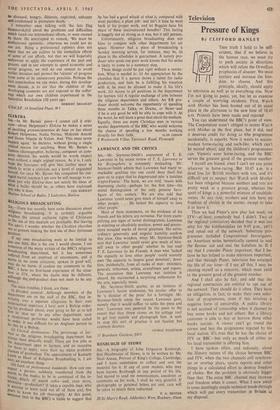R ELIGIOUS BROADCASTING S ik—There has recently been some discussion about religious
broadcasting. It is certainly arguable Whether the almost exclusive rights of Christians t° the use of this medium are justifiable. But leaving this apart, I wonder whether the Christian churches are at present making the best use of their fortunate Position.
; If my own broadcasting were to be limited to Just one field, this is the one I would choose. I am conscious of the many virtues of the BBC's religious broadcasting department, but it has Sometimes suffered from an overload of encomiums, and it seems to me some criticisms, spoken in good will, ril.„ay do no harm. (I confine my comments to the D
C- 1 have no first-hand experience of the situa- tion in ITV, where the faults may be different, although the end-product does not seem to be any better) The main troubles, I think, are these:
(i) Divided control: Although members of the department are on the staff of the BBC, they in- evitahlY owe a separate allegiance to their own ecclesiastical superiors. I have seen a Bishop order- Ih.g his producer about, even going so far as to tell win to 'shut up. In any other department, such
recalcitrant performer would have been called z.o order. It was difficult for an Anglican parson to vlo this to a Bishop.
rn(Ii) Clericat domination; The percentage of lay- ,,en in the religious broadcasting department has lay- always been absurdly small. There are few jobs in ;n department ment open to laymen, and no incentive Or them to apply, since their lay status prohibits Chances of promotion. The appointment of Kenneth sLamb as Head of Religious Broadcasting is, I am
an excellent thing.
exkit0 Lack of professional standards: How can one Peet a parson, suddenly transferred from the tPratcraistbe t do the studio, to he in command of the in- tricate etails of sound radio—and, even more, is vtsion—production? It takes a capable man, who
anxious to learn (and not all of them are), five Years to know his job thoroughly. At this point, someone (not in the BBC) is liable to suggest that
he has had a good whack at what is, compared with most parishes, a plum job: and isn't it time he went back to his proper work, and let Huggins have his share of theseuncovenanted benefits? This feeling is happily not so strong as it was, but it still persists.
Unfortunately, religious broadcasting does not have to compete with other departments for air space. However bad a piece of broadcasting a Sunday morning service, for instance, may be, its place in the schedules is guaranteed. A variety pro- ducer who sends out poor work knows that his series is likely to come to a summary stop.
These things could be put right without a revolu- tion. What is needed is: (i) An appreciation by the churches that if a parson shows a talent for radio production, and feels he is fulfilling his vocation with it, he must be allowed to make it his life's work. (ii) Access to all positions in the department for laymen. (iii) A regular exchange of jobs between the religious department and others. An RB pro- ducer should welcome the opportunity of spending three months in Talks, or Drama, or News—and if he is any good he will be able to cope with it. At the worst, he will learn a great deal about his medium. Equally, there are many Christian men in various secular departments of the BBC who would welcome the chance of spending a few months working


































 Previous page
Previous page